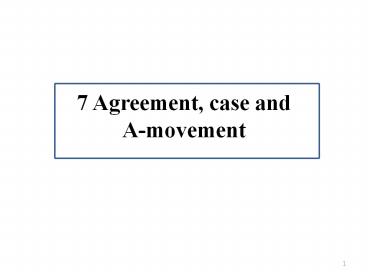7 Agreement, case and A-movement - PowerPoint PPT Presentation
1 / 12
Title: 7 Agreement, case and A-movement
1
7 Agreement, case and A-movement
2
7.2 Agreementthe probe T BE agrees in
ffeatures with the goal several prizes
- There were awarded several prizes
- T
T BE searches for a nominal which - T VP
it c-commands to agree with - BE V
QP NOM - awarded
several prizes - (probe)
(goal) - (3) Earliness Principle
- Operation must apply as early as possible
in a derivation - (4) CP
- C TP
- Ø PRN
T - there T
VP -
were V QP NOM -
awarded several prizes
3
Agreementa systematic relationship between
nominative case assignment and T-agreement
- Evidence Icelandic (Sigurðsson 1996, 12)
- (5) a. Þad voru lesnar fjórar bœkur
- There were read fourNOM.PL
booksNOM.PL - Agreement
- b. Þad var skiað fjórum
bókum - There was returned fourDAT.PL
booksDAT.PL -
(no agreement) - Var (was) is a default form used as a fall-back
when the auxiliary doesnt agree with anything. - Skiað (returned) assigns inherent dative case to
its complement.
DAT
4
7.3 Feature Valuation
- (6) A What happened to the protestors?
- B They were arrested
- T
- T VP
- BE V PRN
- Past-Tns arrested THEY
- u-Pers ffeatures unvalued
3-Pers ffeatures valued - u-Num ffeatures unvalued Pl-Num
ffeatures valued -
u-Case Casefeature unvalued - probe goal
5
(8) Agreement When a probe (like T) agrees
with a goal in its local domain
- the unvalued (person/number) ffeatures on the
probe will be valued (i.e. assigned a value which
is a copy of that on the goal) - the unvalued case feature on the goal will be
valued (i.e. assigned a value dependent on the
nature of the probee.g. nominative if the probe
is a finite T) - (9) T
- T VP
- BE V PRN
- Past-Tns arrested THEY
- 3-Pers
3-Pers - Pl-Num Pl-Num
-
Nom-Case - probe goal
- (10) CP C Ø TP they T were VP V
arrested they
6
7.4 Uninterpretable features Feature Deletion
- Chomsky (1998) valued vs. unvalued grammatical
features - in relation to interpretable vs.
uninterpretable features - T
- T VP
- BE V PRN
- Past-Tns arrested THEY
- u-Pers ffeatures unvalued
3-Pers ffeatures valued - u-Num ffeatures unvalued Pl-Num
ffeatures valued -
u-Case Casefeature unvalued -
(
Case-feature uninterpretable)
7
(13) Table of interpretable uninterpretable
features
Type of constituent interpretable features uninterpretable features
T-constituent tense, aspect, mood person, number
noun expression or pronoun person, number, gender case
Chomsky (2006, 13) If transferred to the
interface unvalued, uninterpretable features will
cause the derivation to crash. i.e., If we assume
that unvalued features are illegible to (and
hence cannot be processed by) the PF component,
it follows that every unvalued feature in a
derivation must be valued in the course of the
derivation, or else the derivation will crash
(i.e. fail) because the PF component is unable to
spell out unvalued features.
8
Uninterpretable features are deleted in the
course of the derivation, and thereby become
invisible to the syntactic and semantic component
(while remaining visible to the PF component).
(Chomsky 2006)
- (14) Feature Deletion
- An uninterpretable feature is deleted
immediately any operation it is involved in
applies, and is thereafter invisible in the
syntactic and semantic components (but visible in
the PF component)
9
(15) a. They believe John to be lying
(ECM) b. They believe John is lying
(EPP)
- (17) TP
- PRN T
- they
- 3-Pers T VP
- Pl-Num were
- Nom Case Past-Tns V PRN
- 3-Pers arrested
they - Pl-Num
- EPP
- T
- T VP
- BE V PRN
- Past-Tns arrested THEY
- u-Pers
3-Pers - u-Num Pl-Num
- EPP
u-Case
(18) Simultaneity Condition All syntactic
operations involving a given probe P
apply simultaneously
10
7.5 Expletive it subjects
- English has two expletive pronouns which carry
no interpretable - f-features.
- (19) a. It is said that he has taken bribes
- b. It can be difficult to cope with
long-term illness - c. Its a pity that she cant come
- (24) TP
an expletive cant be a
probe - PRN T
(Chomsky, p.c.,
Radford 249) - it
BE must be the probe
in (24) and - 3-Pers T VP
expletive it the goal. - Sg-Num BE
- Pres-Tns V
CP - u-Pers said
that he has taken bribes - u-Num
11
7.6 Expletive there
subjects (1) There were awarded several prizes.
- (30) TP
- PRN T
- there
- 3-Pers T VP
- were there
V - Past-Tns V
QP - 3-Pers arrested
several prizes
- Pl-Num
3-Pers - EPP
Pl-Num -
Nom Case
- (28) VP
- PRN V
- there V QP
- 3-Pers arrested several prizes
-
3-Pers -
Pl-Num -
u-Case
Multiple agreement When T-BE probes, it locates
there as the closest possible goal. However,
since there cannot value its unvalued number
feature, T-BE continues to probe and locates the
QP several prizes as a second goal. Thus, T-BE
locates two suitable goals one is there the
other is the QP several prizes.
12
- (32) Expletive Conditions
- External Argument Condition
- An expletive can only be merged as the
highest argument of a verb with no external
argument - (ii) Indefiniteness Condition
- Expletive there can only be merged with a
verb which has an indefinite nominal or
pronominal internal argument - (iii) Inactivity Condition
- Expletive it can only be merged with a
constituent which does not contain a nominal or
pronominal expression with active case- or
f-features
- (33) a. There was awarded only one prize
- b. It was awarded only one prize
- (34) a. It is said that he has taken bribes
- b. There is said that he has taken
- bribes
- (35) a. There was impeached the president
- b.It was impeached the president































